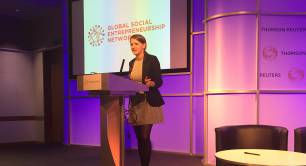Supporting social entrepreneurship in Asia
The Global Social Entrepreneurship Network (GSEN) is an international network of organisations supporting early stage social entrepreneurs, launched by UnLtd. Krisztina Tora of GSEN recently convened a meeting of several such organisations from Asia ahead of the AVPN conference in Hong Kong. Here, she presents a unique snapshot of the challenges and opportunities for such business support organisations in that part of the world.
GSEN members are collectively supporting thousands of social entrepreneurs around the world. Most of these entrepreneurs are currently creating impact at a grassroots or community level, and/or at small scale, but collectively their impact is huge.
If these entrepreneurs get the support they need at the early stages of their journey, their potential to create large-scale change is infinite. As one of the members of the group remarked: “At the moment their ventures are small, but many small streams make one big river.”
Some of the key issues faced by societies in Asia are; how to develop innovative and sustainable social ventures to tackle social needs relating to ageing societies (NPI China for instance has launched a new incubator dedicated to this issue); how to help young people develop a social mindset and how to support more women social entrepreneurs and disseminate the benefits of this work.
Ties between different countries in the social entrepreneurship space in Asian countries are strong and collaboration is fostering a more robust ecosystem for increased social impact. Two recent examples of collaborations building the Asian have been the ASEAN Impact Challenge and the ASEAN Conference on Social Entrepreneurship.
In Hong Kong the following business support organisations came together to share learning: Change Fusion (Thailand), CSIP (Vietnam and Mekong countries), NPI (China), SE Insights (Taiwan), Scope UnLtd (Malaysia), UnLtd Hong Kong, UnLtd India, and UnLtd Indonesia. The following findings emerged:
Long term thinking needs to be the focus
In some countries where the social entrepreneurship scene is driven and heavily subsidised by public authorities there can be a tendency to focus on numbers and outputs delivered, rather than on impact and long-term sustainability.
By contrast GSEN members focus on mobilising great social capital and technical advice to develop the skills and business acumen of the founders and the team leading the social ventures.
It is therefore important for policy makers and others to be careful, and not implement market/impact distorting actions, and seek guidance from experienced organisations (such as GSEN members) who know what quality support looks like, before launching new national programmes.
The major challenges: money and talent
For every $1000 USD of financial support provided to social entrepreneurs, on average, GSEN members help to create one job – a lower cost than traditional business incubators.
However, the annual budget of GSEN members is relatively modest (with an average of $462,500 USD). Evidence from the mainstream business support sector shows that organisations with larger budgets perform better and are able to provide better support to entrepreneurs. What if social entrepreneur supporters had adequate resources too?
...entrepreneurship is seen as a sort of failure or a last resort choice
There was general agreement that talent is a major barrier for social entrepreneurs and their supporters. This is especially true in Asia where there is societal and parental pressure to have a ‘successful career’ (i.e. a traditional/ conservative vision of what professional success looks like) and therefore entrepreneurship is seen as a sort of failure or a last resort choice.
The salary difference between the traditional and the social sector can also be seen as an aggravating factor. For all those reasons, social entrepreneurs have a hard time in attracting, retaining and developing the talent needed for their ventures to grow and thrive. Some organisations have started to look at best practice in this area for social entrepreneurs - the Shell Foundation and Ripple Works are two of them.
Key trends: the role of corporates, the major social challenges and finance
Large corporates were identified as potentially being important partners in the ecosystem of support for social entrepreneurs in Asia. They can be a critical in providing sector specific or industry specific support to social entrepreneurs and could provide the resources to scale innovations and successful social ventures to create change on a systemic level.
In Asia corporates have been relatively timid in engaging with the social entrepreneurship space, but corporate foundations (such as the DBS Bank’s Foundation) are leading the way and will hopefully increasingly bring their colleagues from the core business along.
As elsewhere in the world, in Asia there is a mismatch between the needs of early stage social entrepreneurs and the financial products and services available for them. Several GSEN members in Asia are currently developing and testing innovative financing mechanisms to bridge that gap.
Offers include soft loans, repayable grants, investment showcase platforms (such as impactconnect.asia), or investment through new social investment funds (for example Change Ventures created by Change Fusion in Thailand), depending on what is relevant to their national context.
If you’re interested in further details and data sets about how organisations support early stage social entrepreneur globally and in Asia, please see the following two reports: GSEN’s ‘From Seed to Impact’ and AVPN’s ‘Effective Social Incubation’
Photo credit: Bernard Spragg



